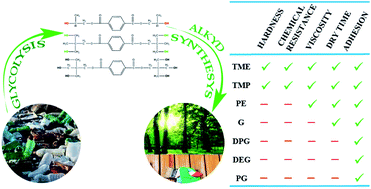High performance alkyd resins synthesized from postconsumer PET bottles
Abstract
The glycolytic recycling of waste PET presents a challenge for the production of secondary value-added products, such as alkyd resins. A way to overcome the unsatisfactory mechanical, drying and chemical resistance properties of alkyds obtained from difunctional glycolyzates was proposed. Waste PET was glycolyzed using multifunctional alcohols: glycerol (G), trimethylolethane (TME), trimethylolpropane (TMP) and pentaerythritol (PE), giving tetra- and hexa-functional glycolyzates and, for comparison, using diethylene glycol (DEG), propylene glycol (PG) and dipropylene glycol (DPG) giving di-functional glycolyzates. The obtained glycolyzates were examined by 1H and 13C NMR, FTIR spectroscopy and elemental analysis and further used in the synthesis of alkyd resins. The properties of the prepared alkyd resins (acid, hydroxyl and iodine values, color, average molar masses and molar mass distributions, viscosity, drying time, hardness, flexibility, gloss, adhesion and chemical resistance) were investigated with respect to the functionality and the structure of the used glycolyzates. Alkyd resins derived from multifunctional glycolyzates (TME and TMP) showed considerably enhanced properties compared to those produced from difunctional glycolyzates and also to conventional general purpose resins.


 Please wait while we load your content...
Please wait while we load your content...